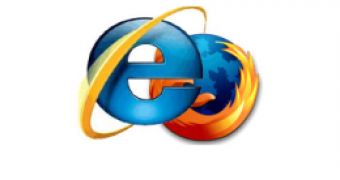Mozilla's open source browser Firefox topped 400 million downloads, according to a report from Spread Firefox. The actual number of downloads is an irrelevant statistic when compared to the usage share, but 400 million spells not only the success of Mozilla but also Microsoft's failure with Internet Explorer. IE currently accounts for 78.68% of the browser market according to Market Hare by Net Applications, but Firefox has been continually eroding its position, and as of August 2007, it holds a share of no less than 14.56%. Internet metrics company OneStat gives Internet Explorer a 84.66% global usage share, and Firefox just 12.72% as of mid 2007, but emphasized the fact that Mozilla's open source browser is on an ascendant trend, unlike IE.
And yet the Microsoft - Mozilla browser face-off is far from over. In fact, the Redmond company has done three mistakes in its strategy for Internet Explorer that will only lead to fueling Firefox's growth. First off, Microsoft will be hurt by the association of Internet Explorer 6 and the second Service Pack for Windows XP. In this manner, IE6 will be supported two years after the release of XP SP3, currently planned by mid 2008. This means that IE6 will live to see 2010 together with Windows XP. This is nothing short of unhealthy for Internet Explorer, as version 6 is a browser with inferior standard of security to Firefox 1.5. And Mozilla has already killed support for version 1.5 in order to breathe life into build 2.0, and to force its user base to a more secure browser.
The second mistake Microsoft is yet to make. In fact, it's under development and being dogfooded over at Redmond as we speak. It is none other than Internet Explorer 8, the successor of v7. IE8, planned for the end of 2008, and in the eventuality of a worst case scenario, the beginning of 2009. Mozilla moves at a more rapid pace. Firefox 3.0 is in the making and on the brink of passing into Beta stage. Firefox 3.0, currently codenamed Gran Paradiso, will be made available by the end of 2007, although it could slip into early 2008. Still, Mozilla will be perceived as being one step ahead of Microsoft. And by the time IE8 hits the market, it could face tough competition from Firefox 4.0. Microsoft should start advertising IE8 as soon as possible, and make the browser development process a tad more open, or Firefox will completely gain the advantage. And relying on Vista to push IE7 is no strategy at all, as the recent statistics indicate that Internet Explorer 7 has hit the equivalent of a dead end at 30% market share, while Firefox 2.0 made it to 12.98% without the support of an operating system.
And the last mistake is related to the contents of Windows XP SP3. Microsoft already announced that XP SP3 will bring no additional features to the current XP SP2. This means that the Redmond company has no plans of integrating IE7 into the third service pack for XP. And this is a huge blunder, because XP SP2 users are starving for SP3, and will take it even if it comes with IE7. Still, one thing that they won't do is to rapidly adopt the browser through Windows Updates and Windows Vista.

 14 DAY TRIAL //
14 DAY TRIAL //